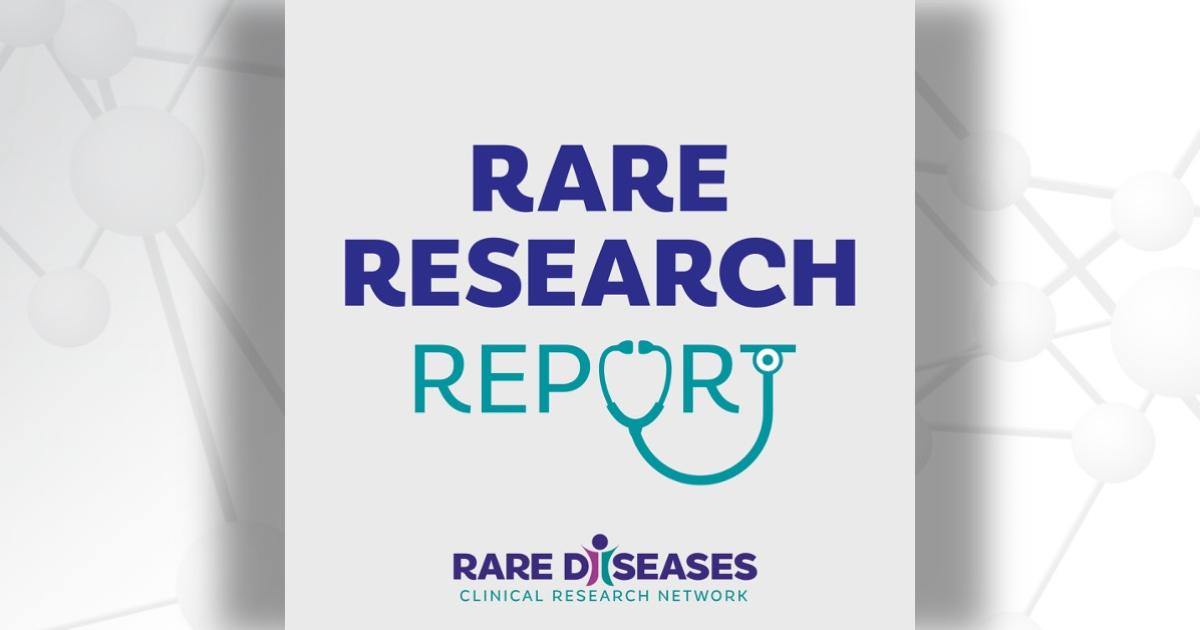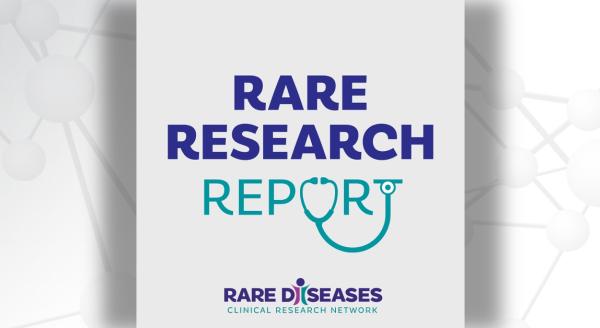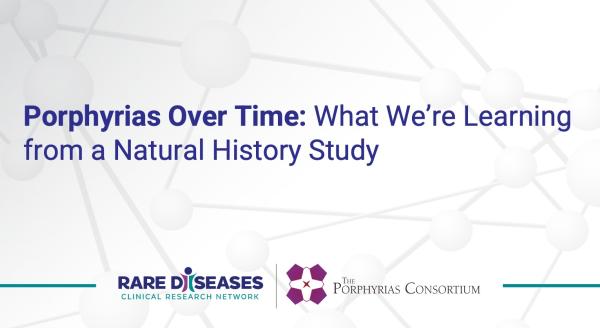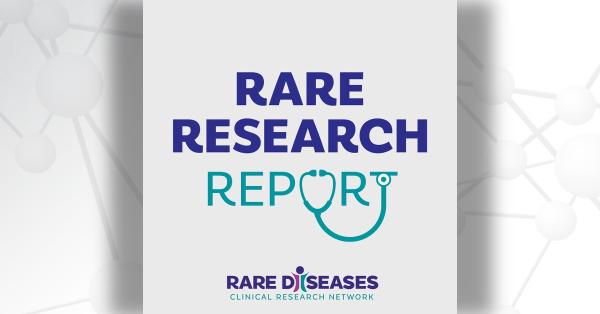Each month, we share summaries of recent Rare Diseases Clinical Research Network (RDCRN) grant-funded publications. Catch up on the latest RDCRN research below.
Jump to:
- Frontiers in Congenital Disorders of Glycosylation Consortium (FCDGC)
- Lysosomal Disease Network (LDN)
- Nephrotic Syndrome Study Network (NEPTUNE)
- Primary Immune Deficiency Treatment Consortium (PIDTC)
Listen to these summaries on the Rare Research Report podcast.
Frontiers in Congenital Disorders of Glycosylation Consortium (FCDGC)
Origin of Monosaccharide Determines Reactions in Glycosylation
Congenital disorders of glycosylation (CDG) are a group of inherited metabolic disorders that affect a process called glycosylation. This process uses monosaccharides (simple sugars) from multiple sources to produce nucleotide sugars (activated forms of monosaccharides). Since these sources of monosaccharides are assumed to contribute to one similar pool, their individual contributions are often overlooked.
In this study, researchers explored the hypothesis that fucose (a type of monosaccharide) exists in multiple, distinct pools. The team measured the contribution of fucose from different sources. Findings show that cells identify and select from different pools of fucose for the process of glycosylation.
Authors also present new perspectives on monosaccharide metabolism, which may have other applications beyond glycosylation.
Sosicka P, Ng BG, Pepi LE, Shajahan A, Wong M, Scott DA, Matsumoto K, Xia ZJ, Lebrilla CB, Haltiwanger RS, Azadi P, Freeze HH. Origin of cytoplasmic GDP-fucose determines its contribution to glycosylation reactions. J Cell Biol. 2022 Oct 3;221(10):e202205038. doi: 10.1083/jcb.202205038. Epub 2022 Sep 2. PMID: 36053214.
Lysosomal Disease Network (LDN)
Exploring Variation in Oxidative Stress and Inflammation Biomarkers in Patients with Gaucher Disease
Gaucher disease type 1 (GD1) is a rare lysosomal storage disorder in which harmful amounts of fatty materials (lipids) accumulate in various cells and tissues in the body. Currently, there is a lack of reliable biomarkers for GD1, which could help predict treatment success or disease progression.
In this study, researchers aimed to validate measures of oxidative stress and inflammation as biomarkers for GD1. For three months, the team investigated and compared variation in various blood-based oxidative stress and inflammation biomarkers in participants with GD1.
Results show that specific biomarkers are consistently altered in GD1, regardless of therapy status. These findings highlight the need for additional therapies that can target and modulate these biomarkers. Authors note that this information can help guide the selection of candidate biomarkers for future intervention-based studies in patients with GD1.
Sahasrabudhe SA, Terluk MR, Rudser KD, Cloyd JC, Kartha RV. Biological Variation in Peripheral Inflammation and Oxidative Stress Biomarkers in Individuals with Gaucher Disease. Int J Mol Sci. 2022 Aug 16;23(16):9189. doi: 10.3390/ijms23169189. PMID: 36012454; PMCID: PMC9409136.
Nephrotic Syndrome Study Network (NEPTUNE)
Endoplasmic Reticulum Plays Critical Role in Developing New Therapies for Acute Kidney Injury
Acute kidney injury (AKI) is a sudden episode of kidney failure or damage that occurs over a few hours or days. New evidence shows that endoplasmic reticulum (ER) stress—which occurs when proteins are not properly folded—is involved in AKI. However, there are currently no treatments for AKI, including ER-targeted therapies.
In this study, researchers aimed to explore the role of ER in AKI. The team outlined several therapeutic chemicals that can target the ER for treatment of AKI. Additionally, researchers identified several potential ER stress biomarkers for early diagnosis and treatment response monitoring in patients with AKI.
Based on this evidence, authors conclude that ER plays a critical role in the pathogenesis and progression of AKI. Authors also emphasize an urgent need to develop ER-targeted therapeutics and discover more ER stress biomarkers at the early stage of AKI.
Li C, Krothapalli S, Chen YM. Targeting Endoplasmic Reticulum for Novel Therapeutics and Monitoring in Acute Kidney Injury. Nephron. 2022 Sep 16:1-4. doi: 10.1159/000526050. Epub ahead of print. PMID: 36116429.
Exploring the Role of T-cell Receptor Diversity in Minimal Change Disease
Minimal change disease (MCD) is one of the most common causes of childhood idiopathic nephrotic syndrome, which is characterized by severe proteinuria (high levels of protein in the urine) and edema (swelling of body parts). For most patients with MCD, proteinuria is rapidly reversible with corticosteroid therapy. However, relapses are common, and repeated courses of immunosuppressive therapy often lead to many adverse events in children.
In this study, researchers explored the role of abnormal T-cell function in these outcomes. The team sequenced T-cell receptors with clinical data and blood samples from patients collected by the Nephrotic Syndrome Study Network (NEPTUNE). To assess the differences between active disease and remission states, researchers calculated several T-cell receptor diversity metrics.
Resulting data do not support an obvious role of the adaptive immune system T-cells in the development of MCD. However, given the study’s limited sample size, authors note that further investigation is warranted.
Liu S, Bush WS, Miskimen K, Gonzalez-Vicente A, Bailey JNC, Konidari I, McCauley JL, Sedor JR, O'Toole JF, Crawford DC. T-cell receptor diversity in minimal change disease in the NEPTUNE study. Pediatr Nephrol. 2022 Aug 9. doi: 10.1007/s00467-022-05696-x. Epub ahead of print. PMID: 35943576.
Primary Immune Deficiency Treatment Consortium (PIDTC)
Chronic granulomatous disease (CGD) is a rare, inherited immunodeficiency that affects granulocytes, a type of white blood cell. Patients with CGD often experience chronic inflammation and frequent infections. To treat these infections, patients sometimes receive granulocyte transfusions. However, granulocyte transfusions can be associated with a high rate of alloimmunization (an immune response to foreign antigens). Additionally, the role of this therapy in CGD patients undergoing hematopoietic cell transplantation (HCT) or gene therapy (GT) is unknown.
In this study, researchers conducted a survey of 27 patients with CGD who received granulocyte transfusions pre- and/or post-HCT or GT. Using participants’ responses, the team estimated the clinical impact of granulocyte transfusions on infections, occurrence of complications, and survival outcomes.
Among this small cohort of patients, researchers found that granulocyte transfusions pre-HCT or GT were associated with high rates of alloimmunization, primary graft failure, and early severe immune-mediated cytopenia post-HCT or GT. However, granulocyte transfusions post-HCT were not associated with an increased risk of graft failure. Based on these findings, authors caution against the use of granulocyte transfusions pre-HCT or GT.
Arnold DE, Chellapandian D, Parikh S, Mallhi K, Marsh RA, Heimall JR, Grossman D, Chitty-Lopez M, Murguia-Favela L, Gennery AR, Boulad F, Arbuckle E, Cowan MJ, Dvorak CC, Griffith LM, Haddad E, Kohn DB, Notarangelo LD, Pai SY, Puck JM, Pulsipher MA, Torgerson T, Kang EM, Malech HL, Leiding JW. Granulocyte Transfusions in Patients with Chronic Granulomatous Disease Undergoing Hematopoietic Cell Transplantation or Gene Therapy. J Clin Immunol. 2022 Jul;42(5):1026-1035. doi: 10.1007/s10875-022-01261-1. Epub 2022 Apr 21. PMID: 35445907; PMCID: PMC9022412.
The Rare Diseases Clinical Research Network (RDCRN) is funded by the National Institutes of Health (NIH) and led by the National Center for Advancing Translational Sciences (NCATS) through its Division of Rare Diseases Research Innovation (DRDRI). Now in its fourth five-year funding cycle, RDCRN is a partnership with funding and programmatic support provided by Institutes, Centers, and Offices across NIH, including the National Institute of Neurological Disorders and Stroke, the National Institute of Allergy and Infectious Diseases, the National Institute of Diabetes and Digestive and Kidney Diseases, the Eunice Kennedy Shriver National Institute of Child Health and Human Development, the National Institute of Arthritis and Musculoskeletal and Skin Diseases, the National Heart, Lung, and Blood Institute, the National Institute of Dental and Craniofacial Research, the National Institute of Mental Health, and the Office of Dietary Supplements.






